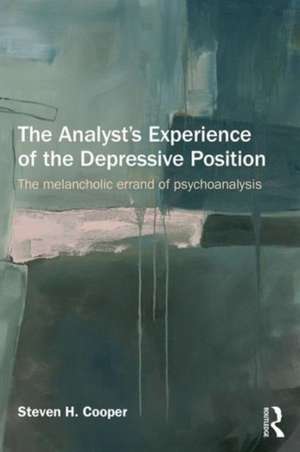The Analyst's Experience of the Depressive Position: The melancholic errand of psychoanalysis
Autor Steven Cooperen Limba Engleză Paperback – 7 apr 2016
The Analyst’s Experience of the Depressive Position includes an exploration of the analyst’s participation and resistance to helping patients hold some of the most unsettling parts of their experience. Cooper draws some analogies between elements of theory about aesthetic experience in terms of how we bear new and old experience. He provides an examination of the patient as an artist of sorts and the analyst as a form of psychic boundary artist. Just as the creative act of art involves the capacity to transform pain and ruin into the depressive position, so does the co-creation of how we understand the patient’s mind through the mind of the analyst.
The Analyst’s Experience of the Depressive Position explores a rich, provocative and long overdue topic relevant to psychoanalysts, psycho-dynamically oriented psychotherapists, as well as students and teachers of both psychoanalysis and psychodynamic psychotherapy.
| Toate formatele și edițiile | Preț | Express |
|---|---|---|
| Paperback (1) | 365.37 lei 6-8 săpt. | |
| Taylor & Francis – 7 apr 2016 | 365.37 lei 6-8 săpt. | |
| Hardback (1) | 1413.09 lei 6-8 săpt. | |
| Taylor & Francis – 6 apr 2016 | 1413.09 lei 6-8 săpt. |
Preț: 365.37 lei
Preț vechi: 384.59 lei
-5% Nou
Puncte Express: 548
Preț estimativ în valută:
69.94€ • 75.99$ • 58.78£
69.94€ • 75.99$ • 58.78£
Carte tipărită la comandă
Livrare economică 21 aprilie-05 mai
Preluare comenzi: 021 569.72.76
Specificații
ISBN-13: 9781138844131
ISBN-10: 1138844136
Pagini: 184
Dimensiuni: 156 x 234 x 14 mm
Greutate: 0.34 kg
Ediția:1
Editura: Taylor & Francis
Colecția Routledge
Locul publicării:Oxford, United Kingdom
ISBN-10: 1138844136
Pagini: 184
Dimensiuni: 156 x 234 x 14 mm
Greutate: 0.34 kg
Ediția:1
Editura: Taylor & Francis
Colecția Routledge
Locul publicării:Oxford, United Kingdom
Public țintă
Postgraduate, Professional, and Professional Practice & DevelopmentCuprins
Section I. THEORETICAL BACKGROUND
Chapter 1 Ruin and Beauty I: Some Basic Assumptions and Models of the Analyst’s
Relationship to the Depressive Position
Chapter 2 Ruin and Beauty II: The Analyst’s Experience and Resistance to Grief and
Sense of Limitation in the Analytic Process
Section II. CLINICAL PROCESS
Chapter 3 The Melancholic Errand of Psychoanalysis: Exploring the Analyst’s "Good Enough" Experiences of Repetition
Chapter 4 Exploring a Patient’s Shift from Relative Silence to Verbal Expressiveness: Observations on an Element of the Analyst’s Participation
Chapter 5 The Analyst’s Relationship to the Psychoanalytic Process
Chapter 6 The Things We Carry: Finding/Creating the Object
and the Analyst’s Self-Reflective Participation
Chapter 7 Revisiting the Analyst as Old and New Object: The Analyst’s Failures and the Therapeutic Action of Psychoanalysis
Section III. SOME BROADER IMPLICATIONS
Chapter 8 Reflections on the Aesthetics of the Psychic Boundary Concept: Or, Why Refer to Sexual Misconduct with Patients as Boundary Violation?
Chapter 9 The Theorist as an Unconscious Participant: Emerging and Unintended Crossings in a Post-Pluralistic Psychoanalysis
Chapter 1 Ruin and Beauty I: Some Basic Assumptions and Models of the Analyst’s
Relationship to the Depressive Position
Chapter 2 Ruin and Beauty II: The Analyst’s Experience and Resistance to Grief and
Sense of Limitation in the Analytic Process
Section II. CLINICAL PROCESS
Chapter 3 The Melancholic Errand of Psychoanalysis: Exploring the Analyst’s "Good Enough" Experiences of Repetition
Chapter 4 Exploring a Patient’s Shift from Relative Silence to Verbal Expressiveness: Observations on an Element of the Analyst’s Participation
Chapter 5 The Analyst’s Relationship to the Psychoanalytic Process
Chapter 6 The Things We Carry: Finding/Creating the Object
and the Analyst’s Self-Reflective Participation
Chapter 7 Revisiting the Analyst as Old and New Object: The Analyst’s Failures and the Therapeutic Action of Psychoanalysis
Section III. SOME BROADER IMPLICATIONS
Chapter 8 Reflections on the Aesthetics of the Psychic Boundary Concept: Or, Why Refer to Sexual Misconduct with Patients as Boundary Violation?
Chapter 9 The Theorist as an Unconscious Participant: Emerging and Unintended Crossings in a Post-Pluralistic Psychoanalysis
Notă biografică
Steven H. Cooper is a psychoanalyst and teacher well known internationally for his interest in integrating independent, Kleinian and relational thinking in his clinical work and writing. A training and supervising analyst at the Boston Psychoanalytic Society and Institute, he is also Associate Professor in Psychiatry at Harvard Medical School and Co-Chief Editor Emeritus at Psychoanalytic Dialogues.
Descriere
The Analyst’s Experience of the Depressive Position: The Melancholic Errand of Psychoanalysisexplores a subject matter previously applied more exclusively to patients, but rarely to psychoanalysts. Cooper probes the analyst’s experience of the depressive position in the analytic situation.









